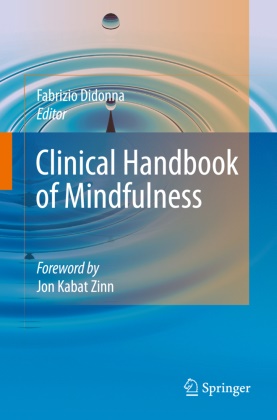Read more
Zusatztext From the reviews: "This book addresses the theory and clinical applications of mindfulness. … In addition to clinicians, researchers, and scholars in psychology, psychiatry, and the social sciences who wish to more thoroughly understand mindfulness and its clinical applications, the editor intends the handbook as a reference for university students and trainees in psychology, psychiatry, social work, psychiatric nursing, and counseling. … This book should be in the library of both those who are interested in learning about mindfulness and those who are faithful practitioners." Gary B. Kaniuk, Doody’s Review Service, November, 2009 "In twenty years, this book might, as most handbooks do, take on a new role as an historical object in its own right, a marker of a creative moment in the history of an emerging field, still in its infancy..." From the foreword by Jon kabat-Zinn "This book draws together a wide range of psychological interventions that incorporate mindfulness-based practices within psychological approaches to treating mental disorders. Such a large number of positions and contribution is rare and, thus, very hard to find. This book will serve as a reference text for anyone wanting to stay up to date on the applications of mindfulness to clinical practice." Prof. Marsha Linehan, Professor of Psychology, University of Washington "This book is set to become a classic text. Open the book at any page and you find writing of extraordinary wisdom and precision. Its vision is comprehensive; and it allows us to see clearly how compelling it is when the art and science of wise investigation are brought together." Mark Williams, Ph.D., Professor of Clinical Psychology, University of Oxford “Clinical Handbook of Mindfulness is an outstanding volume that well represents the most current and cutting-edge research on the subject. … is written in highly accessible language and is recommended for all levels of education. It is most appropriate forsomeone who is looking for a broad introduction to clinical applications of mindfulness, but it will be equally useful for those who want to be part of a new wave of experiential research that is sweeping the field.” (Brent Dean Robbins, PsycCRITIQUES, Vol. 85 (8), February, 2010)"The Clinical Handbook of Mindfulness is a welcome addition to the professional literature in psychology, psychiatry, counseling, and social work. Practicing clinicians and mental health consultants should read the book to enhance their existing knowledge of mindfulness and learn more about its therapeutic utility. The book should also be must reading for anyone interested in or conducting clinical research in the area of mindfulness. For graduate students and trainees, the book could be included in coursework and seminars devoted to therapeutic methods in clinical psychology and, in particular, cognitive behavioral therapy. I hope that the book reaches a wide audience because it is a high-quality publication worthy of widespread attention." (James K. Luiselli, May Institute, July 2010) Informationen zum Autor Fabrizio Didonna is a Clinical Psychologist and Cognitive Behaviour Psychotherapist. He is founder and President of the Italian Institute for Mindfulness (IS.I.MIND). He is Coordinator of the Unit for Mood and Anxiety Disorders, and he also works at the Unit for Borderline Personality Disorders in the Department of Psychiatry at the Casa di Cura Villa Margherita in Vicenza, Italy. He is a teacher and trainer at the School of Cognitive Therapy in Bologna, at the School of Cognitive and Forensic Psychotherapy in Reggio Emilia and at the Institute for Cognitive Science in Grosseto, Italy. He is an experienced instructor of mindfulness groups both in inpatient and outpatient settings and was one of the first therapists who planned and used mindfulness training with patients with severe disorders in inpatient treatment programs. He has given workshops worldwide in...

